#tyndareus
Explore tagged Tumblr posts
Text
~~~
Ulixes Tyndareo Regi consilium de procis Helenae dat Imago ab Huardo Pyle delineata

Odysseus advises king Tyndareus concerning Helen's suitors
Illustration by Howard Pyle
#i've got this brilliant plan#which will definitely not backfire#can I marry your niece now?#odysseus#greek mythology#tyndareus#the oath of tindareus#trojan war#helen of sparta#helen and menelaus#tagamemnon#art#illustration
59 notes
·
View notes
Text
I got curious about how Menelaos gets chosen in various sources and made a little list*: -In the Catalogue of Women, Tyndareos chooses/Menelaos wins because he offers the most bride gifts. [The oath is Tyndareos' idea, as far as we can tell.] -In Stesichorus' Helen (so, the probable first version of his that treated Helen and the Trojan war, not either of his Palinodes), Tyndareos chooses after exacting the oath to keep order and the suitors from fighting each other. [No way to tell if Tyndareos came up with the oath himself or was given the idea, by Odysseus or anyone else.] -In Euripides' Iphigenia in Aulis, Tyndareos allows Helen to choose after exacting the oath as the suitors have begun threatening each other. [Tyndareos comes up with the idea of the oath himself.] -In the Bibliotheke, Tyndareos chooses. [Odysseus is the brain behind the oath.] -In Hyginus' Fabulae (#78), Helen gets to choose because Tyndareos is afraid of the discord that might arise and that Agamemnon might divorce Klytaimnestra. [Odysseus is again the brain behind the oath.] *Based on checking those sources I knew mentioned it plus Gantz's Early Greek Myth, since he's thorough in mentioning if later sources talk about something even if the focus is on earlier ones.
So what we've got is that most of the time in these sources, Tyndareos is the one to choose. In the Catalogue of Women the man chosen is also the one that, on the crassest level, is the most "worthy" by having given most for the woman. (Though it's also the source that notes if Achilles had been old enough, he would have won Helen.) Of course, if there are lost sources that touched on the suitors and Helen's marriage to Menelaos, we won't know that, or what they said about it, but this is what we've got to work with, I'm rather sure.
Tyndareos choosing is of course the most "neutral"/normative option, as that would be the regular course of things. Tyndareos being the one to choose also doesn't appear to have any correlation (as far as we can tell, anyway) whether Helen left or was kidnapped. As in, there's no correlation to whether Helen is portrayed as "guilty" or not when her father has chosen her husband.
Helen choosing comes into play for the first time in Iphigenia in Aulis, and the context of it paints a rather specific picture, I'd say.
"[...] old Tyndareus with no small cleverness had beguiled them by his shrewd device, he allowed his daughter to choose from among her suitors the one towards whom the sweet breezes of Aphrodite might carry her."
"[...] carried Helen off, in mutual desire, to his steading on Ida."
First of all, of course one could probably say much since this is all part of a speech of Agamemnon's. But, if we're allowing what's being said to stand on its own (and if there is an agenda, which undoubtedly there is, it might be Agamemnon's just as much as about how the play, meta-wise, is choosing to represent this), something becomes very clear. Tyndareos is put forth as basically tricking the suitors, and so it puts blame on him. Helen, in being allowed to choose, is made culpable since she then still desired someone not her husband and because of that desire let herself be carried off. The chorus a little later after this both uses "carried off" as well as "fled her home to marry a foreigner". It's thus not just Agamemnon who is framing it both in terms of "kidnapping" and Helen leaving because she desires Paris.
In Hyginus we have no moral flavouring of the same kind as above, since the Fabulae are so very pared down in their language. At most it's a far more neutral casting of Helen being allowed to choose than how Iphigenia in Aulis has it. (But it's probable Hyginus got "Helen got to choose" from that play, much like Euripides and Sophocles' Alexander plays are probable sources for his own account of how Paris comes back to Troy.)
The wider context in which Helen getting to choose her own husband and how it's being portrayed is actually rather important, then, being used as it is in conjunction with Helen being portrayed as desiring Paris. And I think it's kind of interesting how Tyndareos is apparently at first perfectly capable of coming up with the idea of the oath himself, but as soon as Odysseus in later sources worms his way into the narrative, him having come up with it is the version that dominates (especially in later awareness of the story)!
79 notes
·
View notes
Text
In Euripides' The Bacchae, Agave gets inflicted with madness and kills her own son, which causes her to leave the stage into her own exile. Hyginus' Fabulae mentions the fact that her father sent her away to marry King Lycotherses in Illyria, whom then she killed in order to give the rule to Cadmus (who ruled Illyria along with Harmonia after their exile in some sources).
In Euripides' Iphigenia in Aulis, Clytemnestra mentions that Agamemnon killed her first husband along with her infant son, only for her father Tyndareus to ask her to marry him, telling her to forgive Agamemnon and behave as a dutiful wife to him. Years later, she will murder her second husband.
The parallels, man...
17 notes
·
View notes
Text
Etruscan mirrors are so bloody interesting like... What do you mean Hermes carried the egg with Helen in it from the underworld to Castor/Pollux/Leda/Tyndareus/all of them??
What do you mean sometimes they're pointing down to the ground and sometimes the ground is actually depicted as the ocean??? You're saying that the egg was LAID in the underworld and not up here???? The implication being yet again that Nemesis is the mother in these scenarios.
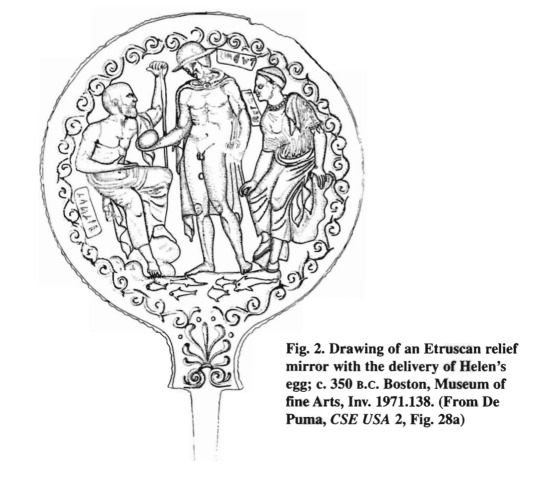
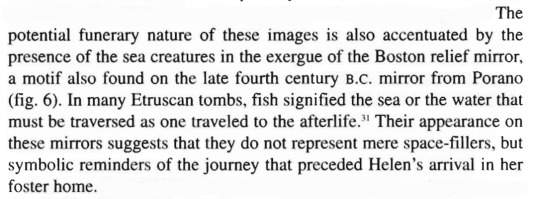
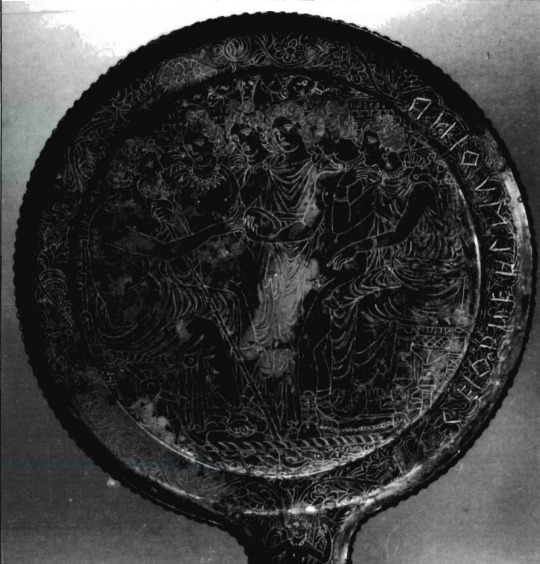
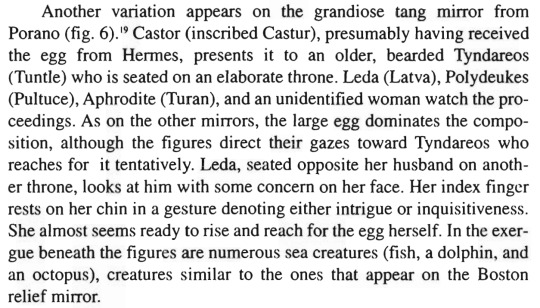
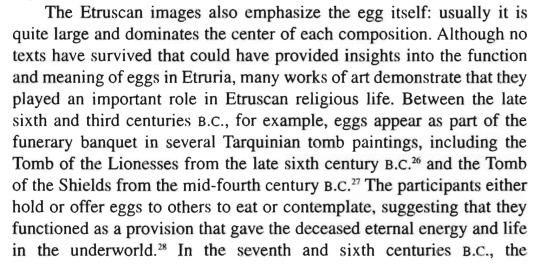
Carpino, Alexandra (1996) "The Delivery of Helen's Egg: An Examination of an Etruscan Relief Mirror," Etruscan Studies: Vol. 3 , Article 2.
Literally knowing of death before her life has begun.
#helen of sparta#nemesis#leda#tyndareus#hermes#dioscuri#etruscan#ancient mythology#this raises SO many questions. how long does the egg stay down there for? Immediately after being laid or just before it's going to hatch??#what counts as her birth 'home'? where she was laid? or where she was hatched? why are the answers to both of these questions 'yes'?#helen daughter of an underworld goddess and olympian god strikes once again. she's got so much range darling.#highly recommend reading the whole article btw. It's very interesting stuff. I feel like I haven't done it the justice it deserves here >_>
27 notes
·
View notes
Text
Wonder if Tyndareus ever saw himself and Icarius in Agamemnon and Menelaus when they sought refuge in his palace.
18 notes
·
View notes
Text
Tyndareus: Leda and me are going to have another two child Agamemnon & Menelaus: That's gre- Tyndareus, slamming adoption papers on the table: It's you, sign here.
#greek mythology#incorrect greek mythology#greek heroes#incorrect greek heroes#incorrect greek quotes#incorrect quotes#iliad#incorrect iliad#tyndareus#leda#agamemnon#menelaus#atreides bros
79 notes
·
View notes
Text
You know how most Greek mythology fans have a love/hate parasocial relationship with Ovid?
I do too but that's also me with Euripides to an even more extreme extent.
I hate that he made Clytemnestra have a husband and son who were murdered by Agamemnon (and I hate that Tyndareus is OK with this even more) because she would've killed him sooner if he did and I hate the idea of eidolon Helen because it really cheapens the Trojan war to me, but he also has so many good ideas.
#Psamathe's happy ending is “canon” to me but everything else about his Helen play is not#euripides#agamemnon#clytemnestra#tyndareus#helen of sparta#helen of troy#greek mythology#greek myth
10 notes
·
View notes
Text

He's fifteen! I don't care if he knows more about sailing than the rest of you, that's just a bad idea!
13 notes
·
View notes
Text
Helen’s Other Sisters – SENTENTIAE ANTIQUAE
#helen#klytaimnestra#clytemnestra#timandra#phylonoe#tyndareos#tyndareus#leda#aphrodite#fragments#greek mythology
9 notes
·
View notes
Text

The once and future kings of Sparta
From left to right, Hippocoon, Icarius, Linos (oc), Tyndareus
4 notes
·
View notes
Text
claps hands
I think today we should celebrate egg!Helen and her family :) I'll start:

#greek mythology#helen of sparta#helen of troy#leda#tyndareus#castor and pollux#give me all the images you can find of egg!Helen!!!
93 notes
·
View notes
Text
You know all of those greek vase paintings that have a bunch of Helen's family (usually Leda, Tyndareus and the Dioscuri but occasionally Clytemnestra too) gathered around an unhatched or newly hatched Helen-egg on an altar?
If we follow along with the fact that this pottery almost always depicts the Dioscuri grown up, and Leda in myth has the Dioscuri, Clytemnestra and Helen at the same time, AND assume they all had separate eggs (or at least Helen had a separate egg). You could headcanon that Helen simply took a very, very long time to hatch.
Therefore, I think it's also fun to headcanon that members of her family visit this egg often prior to hatching. All at different intervals and frequencies, but maybe together too, on occasions where they don't want to leave their unhatched family member out.
Castor and Polydeuces visit frequently, eagerly telling the egg about all of their exploits and adventures, often as soon as they have happened. Both brothers bicker about the little details and try to one-up each other during the storytelling. Wishing that if the egg had hatched already, their sibling could've just joined them and been there to see it. They might occasionally entertain the possibility that they are not twins but in fact triplets because of this egg. They definitely talk as if the egg can hear them, too.
Leda also talks to the egg — it comes naturally to her. Zero hesitation, just full of love and warmth. Tyndareus tries to follow suit, but much like how some people are better at talking to their plants than others to help them grow, he is not very good at it. He's got the right spirit but is incredibly awkward and stilted in conversation. Not really talking to the egg so much as talking at it.
Clytemnestra talks at the egg too, out loud when she's with others, probably starting hopeful as a child and becoming more and more of a sceptic as she gets older. However, when she visits on her own she talks to the egg — in her head. All of the optimism still lingering in there, so much insatiable curiosity and so many unanswered questions. If the Dioscuri have each other, then surely she is missing someone, right? Or is it naive to assume such logic?
They all act differently around this egg, but collectively? They never let it get lonely for too long. (Okay: sappy headcanon over.)
#greek mythology#helen of sparta#leda#tyndareus#dioscuri#headcanon#I feel like I've just waffled for several paragraphs trying to make the points I wanted to make ough#and that's not even all of it. but it will do! you get the jist of it!! my brain is struggling this is what you will get from me today >_<#egg helen taking a really fucking long time to hatch can be endlessly funny AND sweet you just have to think creatively#mystery egg that takes decades to hatch with ZERO knowledge it will even hatch in the first place. and yet. and yet they still care for it.#it occupies space both physically and mentally in all of their minds. they allow it to make space in both places.#they do not let the egg sit and collect dust.
23 notes
·
View notes
Text
Imagine Clytemnestra discovering her father,the man who give her life,sold her to the man who killed her husband and son
Imagine Odysseus putting is pride finally aside and pray 7 years his friend-his goddess to save him and receive no answer
#clytemnestra#agamemnon#fuck Agamennon#Tyndareus#Tantalus#the illiad#Euripides#Aeschylus' Oresteia#ghostcast
49 notes
·
View notes
Text
In light of my recent Asclepius and Apollo musings, I feel like it's the perfect time to post this, actually.
How do you build a human being?
Bold question. Foolish question. But a question it is all the same.
The memory of his father’s consternated expression is still bright behind his eyes, that unusually furrowed brow, the tension in his gentle jaw. He didn’t falter in his setting of Asclepius’ broken shin, hands perpetually steady and sure, but he hesitated for a conspicuously long moment as though reluctant to give an answer. In this body, he resembled Orpheus something fierce. The same flaxen curls of his hair, the same delicate eyelashes that stand stark against the dark brown of his skin. Often Asclepius wondered if his elder brother was nothing but a body built to suit their father’s preferences. The subtle wrinkle of skin around their eyes when they smiled was the same, and the steadiness of their hands, the soothing power of their presence.
And Orpheus did not bleed like Asclepius did. The blood in Asclepius’ veins were as red as any human’s, any mortal’s, but Orpheus seemed not to bleed at all. Even when he’d suffered the same fall down the crumbling cliff as Asclepius had. Even when his skirts had ripped and jagged stone sliced into his shanks.
Even so, Orpheus was unmistakably alive. His eyes were rich with grief fresher than any blood spilt from the worst of Asclepius’ wounds, his counsel too, was tempered with the wisdom of a life well lived. So even at the apex of his most perfect, inhuman beauty, Asclepius never once doubted that his brother was a human being. Just that he was more divine construct than flesh and blood. Just that their father had built for himself a son that would not break as easily as all the others.
His father stayed silent for so long that Asclepius assumed it would be one of the million questions that would go unanswered. Then, just when the last of his bandages had been wrapped -
“A human body is easy to build,” he’d had that faraway look on his face as he spoke, like he was speaking to the horizon. Or a version of Asclepius that was not quite here. Such things happened from time to time. “Any flesh would do. From men, or animals, or even monsters. Any flesh would do.” Their gazes had locked then, and Asclepius would never forget the flecks of gold which swirled in his father’s blue eyes, the weight of divine words rattling at the boundaries of their mortal apparatus, “But the breath of life, a living soul? That is beyond your means as a mortal man. You ought never seek it.”
(Asclepius would remember these words when he revives a man for the first time at the age of nineteen. He’s surprised to find that his father is wrong for once. Souls are easy to source when they’re already eager to return to their mound of flesh.)
#ginger writes#apollo#asclepius#orpheus#greek mythology#greek myth writing#pursuing daybreak posting#No because all this has done is make me think even MORE about Asclepius is this story because that man is Trying#Is he an idiot about it? Yes but that's what makes him compelling methinks#hyacinthusmemorial's 'Asclepius came back but he came back wrong' is SO TRUE LIKE BESTIE#Of all the mortals who ascend Heracles is perhaps one of the blessed few who gets to keep some aspect of his mortal identity#Because he suffered and lost and laboured for so long as a mortal#But Semele lost her name Psyche was completely transformed even Ganymede was robbed of his family#One can only imagine what Asclepius lost when he was brought back#Him as the constellation Ophiuchus is also interesting btw - the forgotten 13th zodiac#Ugh I'll start rambling but what an interesting man and what an interesting history#For posterity btw Asclepius is said to have brought back or attempted to bring back at least four people before Zeus vaporised him#Tyndareus Glaucus Hymenaeus and well Hippolytus#So it wasn't just the one time#Other accounts name a whole host of other people Asclepius revived or brought back from the brink of death#In my mind he's a scientist before he's a doctor and so he's always questioning - always pushing boundaries for better or for worst.
71 notes
·
View notes
Text
Random one: How many children do you have? Tyndareus: Biologically, legally or emotionally?These are three different quantities
#greek mythology#incorrect greek mythology#greek heroes#incorrect greek heroes#incorrect greek quotes#incorrect quotes#iliad#incorrect iliad#tyndareus
60 notes
·
View notes
Text
SUMMARY:
“Don’t sell yourself short. The next time a man kidnaps me, foreigner, I’ll be counting on you to fight for me.”
“I’ll gather up the troupes then. I’ll be on the front lines.”
Or; In a chance encounter, the newly exiled Menelaus and Princess Helen meet for the first time.
(My first work for the Homeric / Epic Cycle. A big thank you again to @katerinaaqu for beta reading! Go follow them for quality content!)
#xan writes#greek mythology#the iliad#tagamemnon#helen of sparta#menelaus#helen x menelaus#helenaus#menelen#first meetings#agamemnon (mentioned)#tyndareus (mentioned)#theseus (mentioned)#ao3 link#archive of our own#ao3#homeric cycle#epic cycle#my bones r tired from school but WE MOVEEE
42 notes
·
View notes